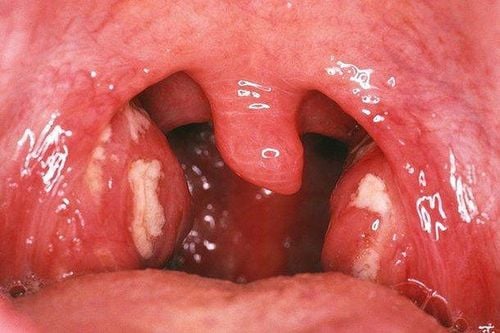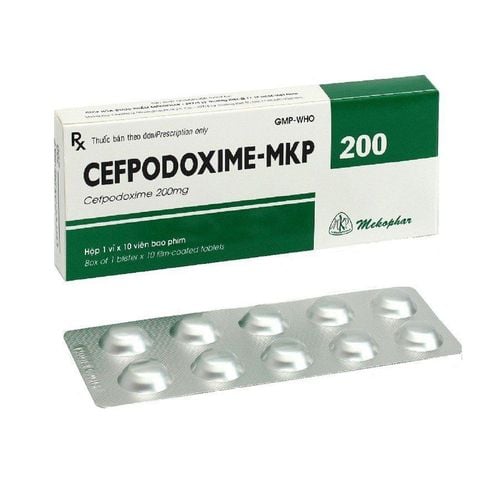This is an automatically translated article.
The article was professionally consulted by Dr. CCII Nguyen Van Thai - Department of Otolaryngology and Head and Neck Surgery, Vinmec Danang International General Hospital. Thai doctor has more than 17 years of treatment experience, especially in the field of Head and Neck Surgery.Tonsillitis is an uncomfortable disease that can affect people of all ages. Although this is a benign disease, if not treated promptly and completely, it will lead to the risk of infection of the entire throat, cancer of the tonsils, sleep apnea, pericarditis, arthritis, rhinosinusitis, etc. ... So should tonsillitis be cut?
1. What is tonsillitis?
Tonsillitis is a common disease in ear - nose - throat diseases, especially in children, while adults are less susceptible. In particular, tonsillitis often recurs, is prone to complications, and affects the patient's health as well as study and work time.The tonsils are lymphocytes that help protect the body against bacterial invasion. The tonsils are also the site of the production of IgG antibodies, which are essential in immunity. This is the immune barrier of the pharynx - mouth, active from the age of 4 - 10 years old. After puberty, the level of immunity of the tonsils will decrease markedly and no longer be active.
When bacteria massively invade and attack the nose and throat, the tonsils have to fight too much, leading to inflammation and redness. As a result, in the tonsils, there will be a concentration of "dead" bacteria and "corpse" of white blood cells, necrotic tissue forming very foul pus lumps. When the tonsils are repeatedly inflamed, the ability to fight bacteria is weakened. At this time, it is the inflammatory foci located in the tonsils (inflammation furnace) which is the starting point for episodes of pharyngitis. Tonsillitis accounts for a high rate in children, often caused by bacteria.

2. Recognizing tonsillitis
Dry throat, bad breath: Due to bacteria accumulating in the tonsils and stagnant pus, often accompanied by some symptoms such as bad breath, dry throat, itchy throat, feeling that there is a foreign body in the throat; Enlarged tonsils: Common in children, sometimes causing difficulty in eating, voice is not clear (voice with haze), respiratory system is not clear or causes snoring or even sleep apnea. If the tonsils are too enlarged, it can lead to disturbances in breathing, speech and swallowing. The tonsils have bleeding, the oral cavity has white or yellow pus spots. Lymph nodes in the neck, especially those in the back of the throat, may be red, swollen, and painful, and the amount of white blood cells is significantly increased. Side effects: When tonsillitis, secretions will go down to the stomach, secreted toxins are absorbed and cause systemic side effects such as fever, indigestion, loss of appetite, fatigue, weight loss, headache. and some other symptoms.3. Complications of tonsillitis
Inflammation - Abscess around the tonsils: Repeated tonsillitis often leads to abscesses around the tonsils, causing sore throat, difficulty swallowing, speechlessness, headache, high fever, bad breath, drooling due to inability to swallowing, mouth opening is limited. The toxin produced by streptococcus causes the patient to have a rash, swollen glands, sore throat, headache, vomiting, high fever, enlarged tonsils, red throat, red tongue, and rapid heart rate. There are cases of complications of acute pericarditis, myocarditis, endocarditis, complications of otitis media, rhinosinusitis, .... Acute arthritis: Symptoms of swelling, heat, redness, pain in the joints of the wrists, knees, fingers, toes, the whole body is tired and sluggish. After complications, arthritis often leads to pericardial disease. Glomerulonephritis following tonsillitis and possibly turning into acute nephritis is worrisome. The patient will have swelling in the legs and face, especially when waking up. Sleep apnea due to enlarged tonsils, if concurrently with enlarged VA, will appear symptoms of snoring, sleep apnea, more serious can cause hypoxia, restless sleep.4. What should I do for tonsillitis?
Tonsillitis is a disease that can cause many dangerous complications and sequelae, which needs to be treated early. In case of acute tonsillitis or recurrent exacerbations of chronic tonsillitis, each episode needs to be used for about 10 days, treated and monitored by ENT specialists.
5. Should tonsillitis be removed?
In many cases, when seeing that their child has tonsillitis several times, parents immediately go to the doctor to cut the tonsils for the child. This concept is wrong.In fact, the indications for tonsillectomy are very limited because tonsils have many benefits for the child's body. Most cases of tonsillitis are mild and do not need to be removed. When the tonsils have a lot of inflammation, the tonsils are completely useless for the body, then think about removing them. Patients with tonsillitis need to go to the hospital for proper treatment by an ENT specialist or to cut the tonsils if necessary.
Indications for tonsillectomy in the following cases:
Acute tonsillitis 5 - 6 times within a year or tonsillitis causing complications: otitis media, sinusitis or severe complications such as: rheumatic heart disease, arthritis, glomerulonephritis.... The tonsils are too large in size, hindering eating and drinking, causing snoring, causing sleep apnea or causing repeated infections, seriously affecting the quality of life. of the patient. Long-lasting chronic tonsillitis, with active medical treatment for 4-6 weeks, but the patient still has sore throat, cervical lymphadenitis, bad breath. Abscess around the tonsils and at least one hospital stay. In addition, tonsillectomy is also indicated when there are many nooks and crannies of the tonsils containing a lot of secretions causing bad breath (tonsillitis stones), difficulty swallowing or suspected malignancy.
6. Note before performing tonsillectomy
Tonsillitis can be removed at any age, but usually after 4 years of age. However, there are cases where younger children still need to have their tonsils removed when the tonsils are too large, causing sleep apnea or complications.Do not remove tonsils in patients with congenital or acquired hemostatic disorders (Hemophilia A, B, C; marrow failure, thrombocytopenia bleeding, blood cancer...). The tonsillectomy should be delayed when the patient has a systemic or local infection, has a chronic disease that is unstable to be treated (diabetes, tuberculosis, hyperthyroidism...) or in endemic areas, women pregnant or menstruating...
7. Complications can be encountered when removing tonsils
Tonsillectomy can cause fatal complications due to many causes such as: reaction to anesthesia - anesthesia, improper cutting technique, cutting large blood vessels causing unstoppable bleeding, patients with coagulation disorders. ..So before cutting tonsils, patients need to do very careful tests on liver function, kidney function and blood clotting ability to avoid unfortunate complications. If there is indication for tonsillectomy, patients should do it at hospitals with ENT specialties, not in private offices because it is easy to have problems.
After surgery, it is necessary to strictly follow the diet and oral hygiene. After removing the tonsils from 7 to 10 days, if there is bleeding, the patient needs to go to the emergency room for the doctor to check and treat promptly. For children under 5 years of age and adults over 45 years old, tonsillectomy should be limited because children under 5 years of age when tonsillectomy may affect their immunity, people over 45 years of age with tonsillectomy will be prone to bleeding due to sclerosing tonsils or tonsillitis. have other comorbidities such as hypertension, cardiovascular disease, diabetes...
Please dial HOTLINE for more information or register for an appointment HERE. Download MyVinmec app to make appointments faster and to manage your bookings easily.














